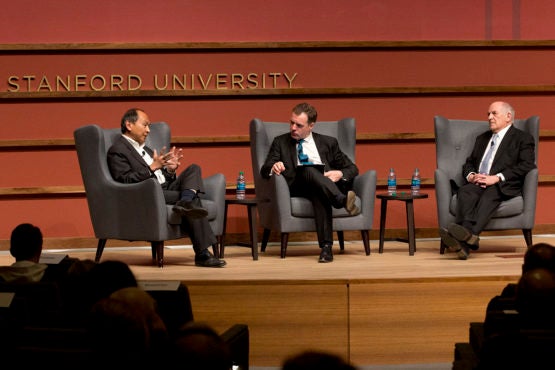At Stanford, Cardinal Conversations event examines inequality and populism
Stanford scholar Francis Fukuyama and political scientist Charles Murray discuss inequality and populism as part of a second event of the Cardinal Conversations initiative.
America’s rising inequality and the populism movement, fueled by polarization, is threatening the foundations of the country’s democratic institutions, said two political scientists at Stanford on Thursday.
Francis Fukuyama, senior fellow at the Freeman Spogli Institute for International Studies, and Charles Murray, emeritus scholar at the American Enterprise Institute, shared the stage to talk about “Inequality and Populism” on Feb. 22 at the Hoover Institution, as part of the ongoing Cardinal Conversations initiative. Hoover Senior Fellow Niall Ferguson moderated the discussion.
The event was the second in the series, launched in January as part of Stanford’s commitment to an open exchange of ideas across the university.
Stanford political science Professor Michael McFaul, who helped design the initiative with Ferguson, underscored the value of the events in fostering challenging, respectful discussions within the Stanford community.

Political scientists Francis Fukuyama, left, and Charles Murray, right, tackled “Inequality and Populism” in the second in a series called Cardinal Conversations. Niall Ferguson, center, moderated the discussion. (Image credit: Patrick Beaudouin)
“We are pairing speakers together with different points of view on the most important topics of our time,” McFaul said in his opening remarks. “We’re not giving anyone the podium alone. We do so because we believe that Stanford should be a place where students, staff, faculty can engage in discussion with people holding a wide range of views.”
McFaul, director of the Freeman Spogli Institute and a Hoover senior fellow, also encouraged students to continue to contribute their input and ideas about future Cardinal Conversations events.
“We believe that students should be in the forefront both in recommending topics and speakers and in participating in Cardinal Conversations,” McFaul said. “I challenge you to get involved and shape this conversation the way you want it to be.”
Thursday’s conversation explored the roots of increasing inequality and divisions among the elite and the poor in America and what could be done to bridge those divisions. Students also participated in a question-and-answer session toward the end of the event.
The political ideological spectrum in America that was once defined by economics has shifted in the last 10 years to one defined by identity politics, the speakers noted. This shift in the way people think about their political identity coupled with increasing polarization could erode democratic institutions, said Fukuyama, director of the Center on Democracy, Development and the Rule of Law, who has written widely on issues concerning democratization and international political economy.
“Populism is good or bad depending on the way the leaders make use of that anger,” said Fukuyama, adding that the national welfare system created by President Franklin Roosevelt also came about as a response to populist movements of that time. “In a healthy democracy you want the political system to respond to that kind of anger.”
But populist leadership, characterized by its disdain for checks and balances against executive power, rule of law, independent media and other democratic institutions, is a recipe for a “toxic stew,” Fukuyama said.
“When you combine that kind of leadership with this kind of popular anger that’s now mobilized … it really puts a threat to the intuitions that define a liberal democracy,” Fukuyama said.
American society has to find a way to reward good citizens who have been failed by the job market, Murray said.
Murray first came to national attention in 1984 with his book Losing Ground: American Social Policy, 1950-1980, which has been identified as the intellectual foundation for the Welfare Reform Act of 1996. His co-authored 1994 book The Bell Curve sparked a heated controversy for its analysis of the role of IQ testing in shaping America’s class structure.
Murray said that over the years of his research he has become more aware of the way luck plays a role in how people fare in life.
“We do not make our own IQ, whether it’s environment or whether it’s genes; the package we’ve got is not due to our own virtue,” Murray said.
Murray said he sees universal basic income as one possible solution that governments could consider as an answer to a loss of jobs due to technological innovations.
“It’s absolutely essential that we revitalize the institutions through which people achieve satisfaction in life, and vocation is definitely one of those, so is community, so is family, so is faith,” Murray said. “And those things we will have to rely upon to have a very broad redefinition of what constitutes living a meaningful life if there comes a time that jobs, traditionally defined, are not readily available for large numbers of people.”
As the conversation took place, about 50 students gathered at History Corner in a peaceful protest to voice their objections to Murray’s presence on campus. In speeches over the course of more than two hours, the students assailed the decision to bring Murray to the campus, citing his past research and publications that they said represented racist and white supremacist perspectives. The students called for additional balance in Cardinal Conversations events and noted that future events will include speakers with perspectives shared by diverse groups and other members of the campus community.
Upcoming Cardinal Conversations events include:
- An April 9 discussion on “Real and Fake News,” with journalist and author Anne Applebaum and broadcaster Ted Koppel
- A May 23 conversation on “Sexuality and Politics,” with philosopher Christina Sommers and journalist Andrew Sullivan
